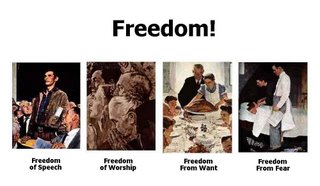Oren demonstrates that suspicion and hostility toward
Islam are almost as old as the nation. John Quincy Adams called it a
"fanatic and fraudulent" religion, founded on "the natural hatred of
Mussulmen towards the infidel."This was partly religious prejudice, of course, but that prejudice was reinforced by unfortunate experience. In the perilous early years of the republic, the Muslim Barbary powers preyed on American shipping and captured, tortured and enslaved hundreds of innocent men and women. When John Adams and Thomas Jefferson implored the pasha of Tripoli to stop, Oren recounts, the pasha's emissary insisted that the Koran made it the "right and duty" of Muslims "to make war upon" whichever infidels "they could find and to make Slaves of all they could take as prisoners." George Washington raged, "Would to Heaven we had a navy to reform those enemies to mankind, or crush them into non-existence." And Congress did create a navy in the 1790s primarily to crush the Barbary powers and protect American traders and missionaries. President
Jefferson -- so often mislabeled as an idealist, pacifist and isolationist -- eagerly launched the war and ordered the permanent stationing of U.S. naval forces thousands of miles from the nation's shores.As Oren relates, the modest number of 19th-century Americans who lived in the Middle East largely considered Islam -- in the words of a former Confederate officer hired to improve the Egyptian army -- a religion "born of the sword," one that was "opposed to enlightenment" and crushed "all independence of thought and action." They found the oppression of Muslim women appalling. Being Americans, they thought the
best antidote was a thorough transformation of culture and society. Protestant missionaries utterly failed to convert Muslims to Christianity, but they did work to spread the "gospel of Americanism": liberalism, technology and democracy.
Monday, January 22, 2007
Our Navy's First Purpose
To stop Islamic pirates. (From Powerline)
Subscribe to:
Post Comments (Atom)






No comments:
Post a Comment